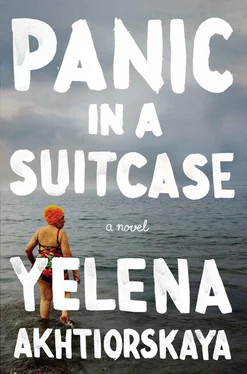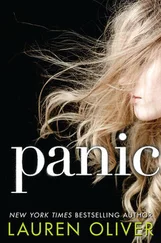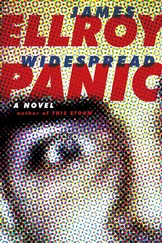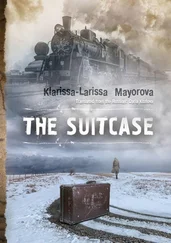They entered a small park, following a narrow, swerving path lined with reassuring oaks that opened out onto a square with a cathedral and a fountain, and Frida felt a swell. I remember this! she cried.
The Sobornaya? clarified Sveta.
Ded took me here. I rode those swings. We fed two sad goats right there by that statue.
Full-scale renovation three years ago, said Pasha. When you left, there was nothing here but a dilapidated cathedral — no swings, no statue, and I greatly doubt the goats.
They did a nice job, though, didn’t they? said Sveta. They even put in trash cans. Not nearly enough, but it’s a start.
• • •
IT WAS THE SORT of place that required an introducer. Frida could’ve passed by fifty times without noticing. If asked, she’d guess that in its place was a post office, but this would be pure speculation. Though Gogol Street was rather touristy, the particular door was locked by a visual code, rendering it invisible to nonnatives. Not that inside it was anything special. Tables, chairs, a leathery man dozing with one pant leg slung over the other in the far corner. All cafés had that far corner, which belonged to the people you could never become. Perhaps the only notable aspect was the lack of distinguishing characteristics. No decorative flourishes, no menu innovations. It was like a café of the spiritual realm, everything understood implicitly.
Nobody bothered to take Frida’s order. She was still in the doorway when the prominent waiter brought her a giant glass, more of a vase, jammed with behemoth ice cubes, and several glass bottles of Coca-Cola. The others got small glasses, sans ice, filled with any beverage of their choosing. They had vast and varied preferences — black currant juice, kvass, Borjomi water, Tarkhun, an aloe-lemon concoction, bilberry mors — all of which were in need of diluting; for those purposes there were bottles of vodka and cognac. If that sounds like a lot of drinks for the three of them, it’s because it wasn’t the three of them. The café into which Pasha had led them happened to be packed with his friends — an international group, poets hailing from Petersburg, New York, Berlin, Zurich, Bucharest, Vienna, even Australia. They’d been trickling into Odessa over the past day for the upcoming Conference of Literature, which was just a convenient stop before the main event, a dress rehearsal for the larger, grander, more refined and much-awaited Russian-Georgian poetry festival, Dreams of Georgia, held in Tbilisi, Batumi, Rustavi, and Tskaltubo.
Is that why you’re here? Are you a poetess yourself? asked a smiley man with psoriatic streaks across his cheeks.
Oh, no, not at all, not me, said Frida, in a hurry to clarify, as if the possibility of being momentarily mistaken for one were inadmissible, an offense to the very concept of poet, though the way it came off was that it would be an offense to Frida’s conception of herself. Everything seemed to fluster her, as if she’d never encountered the likes of it before. She was finding it impossible not to act frazzled in all instances. Or worse yet, disproportionately impressed. But this was just a guise, was it not? She was giving off an entirely wrong impression, unable to locate the correct one. I’m here for my cousin’s wedding, she told the man as he fiddled with the saltshaker. Pasha’s my uncle.
Evidently Pasha had failed to share this development with Efim, who claimed to be a dear old friend. He turned to Pasha and overplayed his hurt.
Pasha shrugged. My son is thirty-five—
Thirty-two, corrected Sveta.
He already has kids. And I’ve barely met his bride-to-be, but from the little I’ve seen—
Efim’s hand signaled Pasha to stop. There was no getting around it. News like this deserved a toast.
Frida lifted her vase of Coke and clinked timidly, then enthusiastically, with all across the table. Some people at the other end, having caught only the broadcast announcement, eyed her with interest, taking her, perhaps, for the future daughter-in-law. And how about the son himself? Would he be joining them for a celebratory drink? Where was the lucky young man? Pasha didn’t know. Pasha didn’t particularly care. The fuss was disturbing. People became strange when it involved news of this sort. Atavisms were activated. Their personalities abandoned them. They lost their cultivated whims and eccentricities, were reduced to elemental humanness. And they became hungry, wanting access. Pasha, instead of rising to the occasion and putting on the proud-father face, sharing an anecdote or two and accepting a pour of champagne, relenting a little in his absolute Pasha-ness, clenched his antisocial jaw and waited out the awkward moment until the subject was dropped and the table splintered into comfortable disunity.
Plates like flying saucers began colonizing tables with fantastic speed and adroitness. Food was not only what clung to the tines of the fork but also what filled ears. The corners of Frida’s eyes were salivating. Silverware mishaps, guffaws, the flashing hands of waiters — all were food. A man swayed over a piano, not making music but kneading air. Everything looked scrumptious, yet not entirely edible. No matter what she tried, there was a hint of turned eggplant. It was a while before she looked up. When she did, Pasha was transformed. He’d grown animated and wide-eyed, voluble, dynamic. Flanked by two men, one of them arresting, with geologic features and demonic eyes, an ethnic hat, and an articles-have-been-written-about-me air, the other quite plain, with a puffy pinkish face, large arms, and an ineffable quality — the kind of man to sneak into dreams and tinker with the dreamer’s perception of him. Pasha’s elbows rested on the table. His lower lip was pronounced, like that of a rabbi in a kitchen, painting. When either of the men spoke, Pasha’s eyes lifted to the heavens. He giggled often and abruptly.
The cloud of cigarette smoke thickened. Frida’s eyes burned, lungs ached, accustomed to American standards. She stepped outside for the closest thing this city had to fresh air, immediately followed by Sveta with her regenerating cigarette. Sveta gave Frida a look of sympathy, as if they were both suffering quietly through this occasion or this life, and exhaled into her face.
A lady with short orange hair came out to see where Sveta had gone, and in search of the lady with the orange hair came two others, and in a few minutes they were a huddle of gossiping ladies with jarring laughs and warring perfumes. Sveta apologized to Frida because they were being prevented from having a heart-to-heart. Her breath was pungent and the cracks of her lips stained blue. A Mediterranean wind turned the corner. Sveta’s unnaturally rigid hair split open, exposing a deformed ear. Frida studied it, mesmerized. But it was quickly returned to its box of hair, hidden away like all things of interest.
Frida’s phone rang — could it finally be Sanya, the lucky young man, the closest thing she had to a brother, whose adult voice she had yet to hear? Against all odds she succeeded in a casual allo. But it wasn’t Sanya. Once again she found herself being shouted at. It seemed not threatening but somehow informative. Not an ounce of meaning could be extracted. This time she felt that she deserved this treatment and that everybody knew she was getting it. But when she looked around, everybody was gone, the huddle of women dispersed; she stood alone on a curb across the street from a casino. There were no stars or cats, no excuses to linger.
Returning to the table, Frida overheard an unpleasant snippet in which Sveta was pointed at and referred to, in surreptitious English, as the Bride of Frankenstein. Then, during a baffling search for the restroom, Frida stumbled into Pasha being called, and not even with the decency of a whisper, a royal asshole suffering from a Jesus complex. She bent down to adjust a sandal strap. Pasha did have some talent, there was no denying that, but his poetic views were egregiously conservative. There were good poems, but there were too many poems — inspiration didn’t visit anybody on such a regular basis. And apparently he beat his ex-wife, but who wouldn’t have?
Читать дальше












